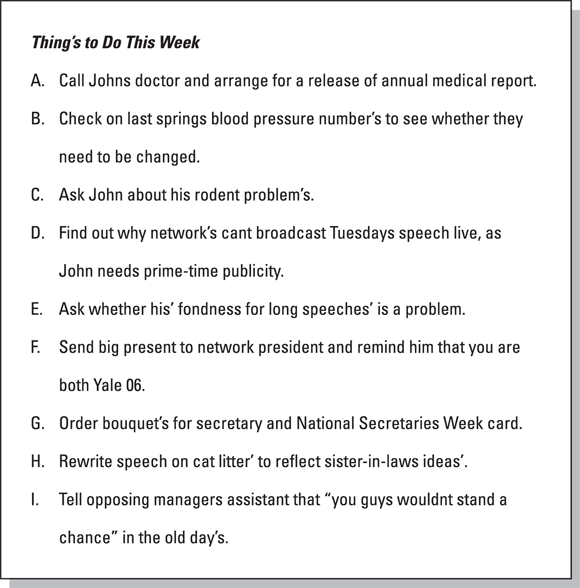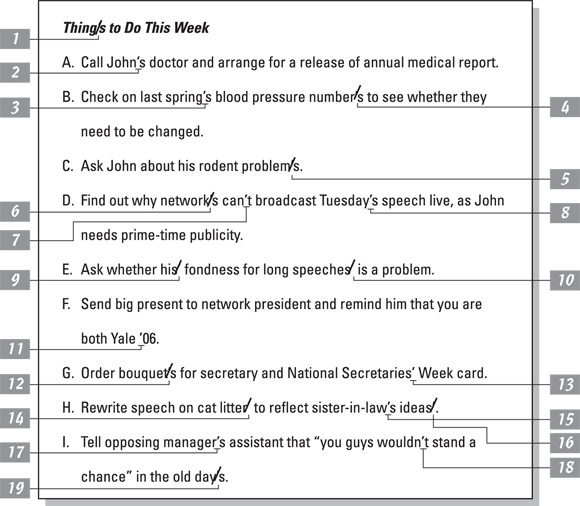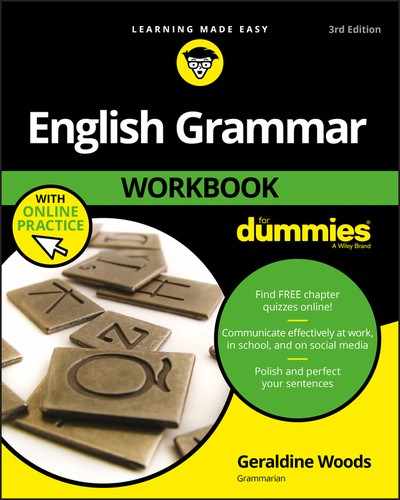Chapter 9
A Hook That Can Catch You: Apostrophes
IN THIS CHAPTER
![]() Showing ownership with apostrophes
Showing ownership with apostrophes
![]() Forming contractions by replacing letters and numbers with apostrophes
Forming contractions by replacing letters and numbers with apostrophes
An apostrophe is a little raised hook (’) that allows writers to show possession and shorten words. Unfortunately, apostrophes have a tendency to snag most writers at some point. With some practice, though, you can confidently insert apostrophes into the proper spots in your writing.
- To create a plural: You have one arrow and two arrows, not two arrow’s. The no-apostrophe-for-plural rule holds true for names. I am one person named Woods, and members of my family are the Woodses, not the Woods’.
- With a possessive pronoun: Don’t use an apostrophe in a possessive pronoun (my, your, his, hers, its, ours, theirs, whose, and so on).
Hook into the exercises in this chapter so that no apostrophe snags you ever again.
Showing Who Owns What: Possessives
An apostrophe allows you to turn the awkward-sounding phrase “the pen of my aunt” into “my aunt’s pen.” To show possession with apostrophes, keep these rules in mind:
- Singular owner: Attach an apostrophe and the letter s (in that order) to a singular person, place, or thing to express possession (“Henry’s tooth,” “the platypus’s flipper”).
- Plural owner: Attach an apostrophe to a regular plural (one that ends in s) to express possession (“the boys’ ties,” “the octopuses’ arms”).
- Irregular plural owner: Add an apostrophe and the letter s, in that order, to an irregular plural (one that doesn’t end in s) to express possession (“the men’s shoe department”).
- Joint ownership: If two or more people own something jointly, add an apostrophe and an s (in that order) to the last name (“Abe and Mary’s sofa”).
- Separate ownership: If two or more people own things separately, everyone gets an apostrophe and an s (“James’s and Ashley’s pajamas”).
- Hyphenated owner: If the word you’re working with is hyphenated, just attach the apostrophe and s to the end (“mother-in-law’s office”). For plurals ending in s, attach the apostrophe only (“three secretary-treasurers’ accounts”).
- Time and money: Okay, Father Time and Mr. Dollar Bill don’t own anything. Nevertheless, time and money may be possessive in expressions such as next week’s test, two hours’ homework, a day’s pay, and so forth. Follow the rules for singular and plural owners, as explained at the beginning of this bulleted list.
Q. The style of this year muscle car is Jill favorite.
A. year’s, Jill’s. Two singular owners. Jill is the traditional owner — a person — but the time expression also takes an apostrophe.
1 Carol classic car is entered in tonight show. __________________ __________________
2 She invested three months work in restoring the finish. __________________
3 Carol will get by with a little help from her friends; Jess and Marty tires, which they purchased a few years ago by combining their allowances, will be installed on her car. __________________
4 The boys allowance, by the way, is far too generous, despite their sister-in-law objections. __________________ __________________
5 Jill weekly paycheck is actually smaller than the brothers daily income. __________________ __________________
6 Annoying as they are, the brothers donate a day pay from time to time to underfunded causes such as the Children Committee to Protect the Environment. __________________ __________________
7 Carol couldn’t care less about the environment; the car gas mileage is ridiculously low. __________________
8 She cares about the car, however. She borrowed Jess and Marty toothbrushes to clean the dashboard. __________________
9 Now she needs her helpers maximum support as the final judging nears. __________________
10 She knows that the judge decision will be final, but just in case she has volunteered two thousand dollars worth of free gasoline to his favorite charity. __________________ __________________
11 Carol success is unlikely because the court judgments can’t be influenced by anything but the law. __________________ __________________
12 Last week, for example, the judge ruled in favor of a developer, despite his mother-in-law plea for a different verdict. __________________
13 Ten hours begging did no good at all. __________________
14 Tomorrow the judge will rule on the car show effect on the native animals habitat. __________________ __________________
15 The geese ecosystem is particularly sensitive to automotive exhaust. __________________
Tightening Up Text: Contractions
Apostrophes shorten words by replacing one or more letters. The shortened word, or contraction (not to be confused with the thing pregnant women scream through), adds an informal, conversational tone to your writing.
The most frequently used contractions, paired with their long forms, include those in Table 9-1.
Table 9-1 Frequently Used Contractions
|
Long Form |
Contraction |
Long Form |
Contraction |
Long Form |
Contraction |
|
Are not |
Aren’t |
I will |
I’ll |
We are |
We’re |
|
Cannot |
Can’t |
I would |
I’d |
We have |
We’ve |
|
Could have |
Could’ve |
It is |
It’s |
We will |
We’ll |
|
Could not |
Couldn’t |
She has |
She’s |
Were not |
Weren’t |
|
Do not |
Don’t |
She is |
She’s |
Will not |
Won’t |
|
He has |
He’s |
She will |
She’ll |
Would have |
Would’ve |
|
He is |
He’s |
Should have |
Should’ve |
Would not |
Wouldn’t |
|
He will |
He’ll |
Should not |
Shouldn’t |
You are |
You’re |
|
He would |
He’d |
They are |
They’re |
You have |
You’ve |
|
I am |
I’m |
They have |
They’ve |
You will |
You’ll |
|
I had |
I’d |
They will |
They’ll |
You would |
You’d |
You also can slice numbers out of your writing with apostrophes, especially in informal circumstances. This punctuation mark enables you to graduate in 2019, marry in ’25, and check the maternity coverage in your health insurance policy by early ’27.
Q. Adam said that he would go to the store to buy nuts. __________________
A. he’d. This apostrophe is a real bargain. With it, you save four letters.
16 “Peanuts are not the best choice for an appetizer, because of allergies,” commented Pam. __________________
17 “I am sure that you will choose a better appetizer,” she added. __________________ __________________
18 The store will not take responsibility for your purchase. __________________
19 Do not underestimate the power of a good appetizer. __________________
20 You are cheap if you do not provide at least one bowl of nuts. __________________ __________________
21 “Adam would have bought caviar, but I would not pass the walnut counter without buying something,” commented Pam. __________________ __________________
22 “You cannot neglect the dessert course either,” countered Adam. __________________
23 Adam usually recommends a fancy dessert such as a maple walnut ice cream sundae, but he is watching his weight. __________________
24 “If they created a better diet ice cream,” he often says, “I would eat a ton of it.” __________________
25 “Yes, and then you would weigh a ton yourself,” snaps Pam. __________________
26 She is a bit testy when faced with diet food. __________________
27 Of course, Adam could have been a little more diplomatic when he mentioned Pam’s “newly tight” slacks. __________________
28 Adam is planning to serve a special dessert wine, Chateau Adam 1999, to his guests. __________________
29 He always serves that beverage at reunions of the class of 2006. __________________
30 We are planning to attend, but we will bring our own refreshments! __________________ __________________
Calling All Overachievers: Extra Practice with Apostrophes
Marty’s to-do list, shown in the following figure, needs some serious editing. Check the apostrophe situation. You need to find nine spots to insert and ten spots to delete an apostrophe.

Answers to Apostrophe Problems
Did you get caught on any of the apostrophe questions in this chapter? Check your answers to see how you did.
1 Carol’s, tonight’s. Carol owns the car, so you just need to attach an apostrophe and an s to a singular form to create a singular possessive. The second answer illustrates a time/money possessive expression.
2 three months’. The value of time and money can be expressed with a possessive form. Because you’re talking about months, a plural, the apostrophe goes after the s.
3 Jess and Marty’s. The sentence tells you that the boys own the tires together, so only one apostrophe is needed. It’s placed after the last owner’s name. The possessive pronoun her, like all possessive pronouns, has no apostrophe.
4 boys’, sister-in-law’s. The plural possessive just tacks an apostrophe onto the s in regular, end-in-s plurals. Hyphenated forms are easy too; just attach the apostrophe and an s to the end.
5 Jill’s, brothers’. The first form is singular, so you add an apostrophe and an s. The second form is a regular plural, so you just add the apostrophe.
6 a day’s, Children’s. The first form falls into the time/money category, and because day is singular, you add an apostrophe and an s. The second is an irregular plural (not ending in s), so you tack on an apostrophe and an s.
7 car’s. A singular possessive form calls for an apostrophe and an s.
8 Jess’s and Marty’s. Okay, the brothers are close, but they draw the line at shared toothbrushes. Each owns a separate brush, so each name needs an apostrophe.
9 helpers’. To create a plural possessive of a word ending in s, just attach an apostrophe.
10 judge’s, two thousand dollars’. The first answer is a simple, singular possessive, so an apostrophe and an s do the trick. The second is a time/money possessive, and two thousand dollars is plural, so just an apostrophe is needed.
11 Carol’s, court’s. These two words are singular, so only an apostrophe and the letter s are needed to make each possessive.
12 mother-in-law’s. The apostrophe and the letter s follow the last word of the hyphenated term.
13 Ten hours’. The apostrophe creates an expression meaning ten hours of begging. Because hours is plural, only an apostrophe is added.
14 car show’s, animals’. The first is a singular possessive, and the second is plural.
15 geese’s. The word geese is irregular. In an irregular plural, an apostrophe and the letter s are added.
16 aren’t. The contraction drops the letter o and substitutes an apostrophe.
17 I’m, you’ll. In the first contraction, the apostrophe replaces the letter a. In the second, it replaces two letters, w and i.
18 won’t. This contraction is irregular because you can’t make an apostrophe-letter swap. Illogical though it may seem, won’t is the contraction of will not.
19 Don’t. Drop the space between the two words, eliminate the o, and insert an apostrophe to create don’t.
20 You’re, don’t. The first contraction sounds exactly like the possessive pronoun your. Don’t confuse the two.
21 would’ve, wouldn’t. Take care with the first contraction; many people mistakenly re-expand the contraction would’ve to would of (instead of the correct expansion, would have). The second contraction, wouldn’t, substitutes an apostrophe for the letter o.
22 can’t. Did you know that cannot is written as one word? The contraction also is one word, with an apostrophe knocking out an n and an o.
23 he’s. The same contraction works for he is (as in this sentence) and he has.
24 I’d. You’re dropping the letters woul.
25 you’d. The same contraction works for you would (as in this sentence) and you had.
26 She’s. The apostrophe replaces the letter i.
27 could’ve. Be careful in re-expanding this contraction. A common mistake is to write could of, an expression that’s a total no-no.
28 ’99. A date may be shortened, especially if you’re out with Adam. Just be sure that the context of the sentence doesn’t lead the reader to imagine a different century (2099, perhaps). This one is fairly clear, given that we’re nowhere near 2099 or 1899.
29 ’06. Not much chance of the reader misunderstanding which numbers are missing here (unless he or she is really old)!
30 We’re, we’ll. The apostrophes replace the letter a and wi.
Here are the answers to the “Overachievers” section:

1 Plural words that aren’t possessive need no apostrophes, so remove the apostrophe from Things.
2 The doctor belongs to John (in a manner of speaking), so the apostrophe is needed to show possession.
3 This time expression (spring’s) needs an apostrophe before the s.
4 The plural numbers isn’t possessive, so it shouldn’t have an apostrophe.
5 A simple plural (not possessive, not a numeral, and so on) takes no apostrophe, so problems shouldn’t have an apostrophe.
6 The networks aren’t possessing anything here, so no apostrophe is needed in this plural.
7 In this contraction (can’t), the apostrophe replaces the letters n and o.
8 Time expressions sometimes use apostrophes, as in Tuesday’s.
9 Possessive pronouns don’t have apostrophes, so his is the word you want.
10 A plural (speeches) takes no apostrophe.
11 Missing numerals (in this case, 20) are replaced by an apostrophe.
12 A simple plural (bouquets) doesn’t take an apostrophe.
13 This plural possessive form — the secretaries own the week, symbolically — adds an apostrophe after the s.
14 In this sentence, litter isn’t possessive and doesn’t need an apostrophe.
15 A hyphenated singular form takes an apostrophe and an s to become possessive, so sister-in-law’s is the correct answer.
16 The plural noun ideas isn’t possessive, so it shouldn’t carry an apostrophe.
17 A singular possessive is created by adding an apostrophe and an s.
18 In this contraction, the missing letter o is replaced by an apostrophe.
19 Days is just plural, not possessive, so it doesn’t take an apostrophe.

 The most common apostrophe mistake is to place one where it’s not appropriate. Don’t use an apostrophe in either of these circumstances:
The most common apostrophe mistake is to place one where it’s not appropriate. Don’t use an apostrophe in either of these circumstances:  Easy stuff, right? See whether you can apply your knowledge. Turn the underlined word (or words) into the possessive form. Write your answers in the blanks provided.
Easy stuff, right? See whether you can apply your knowledge. Turn the underlined word (or words) into the possessive form. Write your answers in the blanks provided.  College entrance tests won’t ask you to insert an apostrophe into a word, but they may want to know whether you can spot a misplaced mark or an improperly expanded contraction. An apostrophe shortens a word, and a common mistake is to re-expand a contraction into something it was never meant to be. The contraction should’ve, for example, is short for should have, not should of. The expressions should of, could of, and would of don’t exist in Standard English. If you see one of these turkeys on the SAT or the ACT, you know you’ve found a mistake.
College entrance tests won’t ask you to insert an apostrophe into a word, but they may want to know whether you can spot a misplaced mark or an improperly expanded contraction. An apostrophe shortens a word, and a common mistake is to re-expand a contraction into something it was never meant to be. The contraction should’ve, for example, is short for should have, not should of. The expressions should of, could of, and would of don’t exist in Standard English. If you see one of these turkeys on the SAT or the ACT, you know you’ve found a mistake. If a word ends in s (Jess, for example), adding an apostrophe and another s creates a spit factor: People tend to spray saliva all over when saying the word. To avoid this unsanitary problem, some writers add just the apostrophe (Jess’), even though technically they’ve neglected the extra s. Grammarians generally allow this practice, perhaps because they too dislike being spit on. In all but the strictest situations, either form is acceptable.
If a word ends in s (Jess, for example), adding an apostrophe and another s creates a spit factor: People tend to spray saliva all over when saying the word. To avoid this unsanitary problem, some writers add just the apostrophe (Jess’), even though technically they’ve neglected the extra s. Grammarians generally allow this practice, perhaps because they too dislike being spit on. In all but the strictest situations, either form is acceptable.